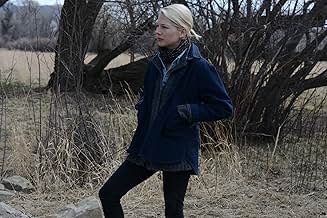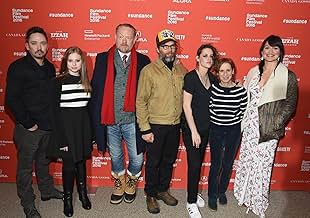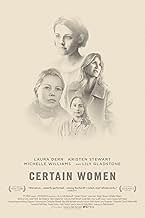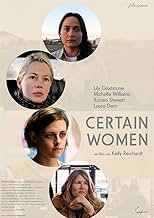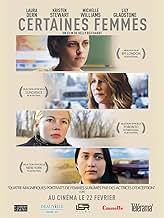VALUTAZIONE IMDb
6,4/10
16.616
LA TUA VALUTAZIONE
Le vite di tre donne si intersecano in una piccola città degli Stati Uniti, dove tracciano imperfettamente alle spalle una scia.Le vite di tre donne si intersecano in una piccola città degli Stati Uniti, dove tracciano imperfettamente alle spalle una scia.Le vite di tre donne si intersecano in una piccola città degli Stati Uniti, dove tracciano imperfettamente alle spalle una scia.
- Regia
- Sceneggiatura
- Star
- Premi
- 11 vittorie e 49 candidature totali
Sara Twist
- Guthrie
- (as Sara Rodier)
Recensioni in evidenza
Kelly Reichardt is one of those director/writers who has made it their focus to film, the unfilmable, ordinary people in their downtime simply reacting or not reacting to things. This is all well and good, and each piece of Certain Women works beautifully on their own, but as a collection pulled together it feels random and unfocused and not in a good way.
The three stories of Certain Women are all set in and around the same small town in Montana and are also loosely connected (a few side characters show up in different segments which are more of a distraction than a convincing narrative thread). The women of the three stories are Laura (Laura Dern) a personal injury lawyer dealing with a disabled and embittered client who won't accept that he signed away his rights, Gina (Reichardt's muse Michelle Williams, working with her fort the third time) an uptight woman trying to get the material needed for her dream home, and Jamie (newcomer Lily Gladstone, amazing), a lonely rancher who unexpectedly falls for a lawyer she meets in the strangest of circumstances. The stories are all very undramatic and subtle but in Reichardt's hands the material absolutely sings. There is a lot of depth and nuance to these characters and it is wonderful to watch them. Unfortunately she does not afford equal time to all the characters and this has the effect of making her film feel lopsided.
The best segment in the film is the one with Gladstone's rancher, and I sincerely wish that Reichardt had worked out a way to pad it out with 40 more minutes of material because at 50 minutes it is the longest segment by far and it is the most interesting and the most poignant.
The three stories of Certain Women are all set in and around the same small town in Montana and are also loosely connected (a few side characters show up in different segments which are more of a distraction than a convincing narrative thread). The women of the three stories are Laura (Laura Dern) a personal injury lawyer dealing with a disabled and embittered client who won't accept that he signed away his rights, Gina (Reichardt's muse Michelle Williams, working with her fort the third time) an uptight woman trying to get the material needed for her dream home, and Jamie (newcomer Lily Gladstone, amazing), a lonely rancher who unexpectedly falls for a lawyer she meets in the strangest of circumstances. The stories are all very undramatic and subtle but in Reichardt's hands the material absolutely sings. There is a lot of depth and nuance to these characters and it is wonderful to watch them. Unfortunately she does not afford equal time to all the characters and this has the effect of making her film feel lopsided.
The best segment in the film is the one with Gladstone's rancher, and I sincerely wish that Reichardt had worked out a way to pad it out with 40 more minutes of material because at 50 minutes it is the longest segment by far and it is the most interesting and the most poignant.
8vsks
You know from the movie previews and the rumblings from the multiplex's adjacent theater that today's movies are heavily weighted toward "action films." Writer-director-editor Kelly Reichardt could singlehandedly reverse that trend with Certain Women, which can most succinctly be described as an "inaction film." It's kind of hard to get used to Reichardt's pace, so you might watch this and think "Wha---?" Here, the drama is at the deep inside the characters, hidden from all views except the closest. And that's what it gets from Reichardt—"a poet of silences and open spaces," says A.O. Scott in the New York Times. Based on short stories by Maile Meloy, the film is set in and around Livingston, Montana, and the views of the lonely snowswept plains are breathtaking. The story is presented in three separate vignettes that barely intersect. In the first, Laura Dern plays Laura Wells, a lawyer trying to convince her persistent client (Jared Harris) that he can't sue his former employer for on-the-job injuries because he already accepted a settlement. The client doesn't believe it until a male lawyer tells him the same thing. She's disappointed at many levels—with her clients, her career, her love life. The middle vignette involves Gina (Michelle Williams), a married woman with a disaffected teenage daughter. She and her husband are building a new house, and she hopes to convince a slightly addled, elderly neighbor (Rene Auberjonois) to sell them a pile of unused sandstone blocks in his front yard. Behind Gina's bright smile, you can feel her irritation that the neighbor focuses his attention not on her request but on her husband, eliding the decision, and finally the husband sells her out. Even within the bosom of her family, it's clear, she's alone. The dreamiest and most poignant sequence follows the young woman Jamie—beautifully underplayed by Lily Gladstone—on her daily routine, feeding and caring for a group of horses on a remote ranch. The repetitiveness of her tasks in the snowy, mountains in the distance, is mesmerizing. Her routine and her equilibrium are disturbed by a chance acquaintance with Beth, a harried young lawyer played by Kristen Stewart, overwhelmed by her own, very different grind. The extent of Jamie's disturbance is painfully revealed in her quiet face, upon which "silent passion surges like an underground stream," Scott says. The acting is subtle and true, and Reichardt closely follows the dictum, "show, don't tell." Her characters don't scream and rail and tell you what their issues are. You see it laid bare in front of you.
Greetings again from the darkness. This is surely one of the most intriguing movies of the year that is about women and by a woman. Writer/director Kelly Reichardt (Wendy and Lucy, 2008) has adapted the short stories from Maile Meloy into a film with 3 segments focusing on the daily perseverance of three women in small town Montana (including a rare Wyoming joke).
The first segment has lawyer Laura Dern returning to the office after an umm "long lunch meeting". Waiting for her is her client played by Jared Harris ("Mad Men"). The frustration between the two is palpable. Things take a turn for the worse as the sheriff calls Dern to the scene where Harris has taken a hostage at gunpoint. The issues on display here include the lack of respect for a female attorney, her unsatisfying personal life, and the one-way trust that can happen in times of desperation.
In the next story, we follow Michelle Williams and her husband James LeGros as they meet with a lonely elderly neighbor (Rene Auberjonis) and offer to buy some limestone blocks that have been sitting on his property for decades. The subtlety of the conversation embodies the missing respect and power of Ms. Williams' character.
Emotions are exploding beneath the surface in the third segment featuring horse handler Lily Gladstone as she stumbles into a class being taught by Kristen Stewart, and is immediately captivated by the smart young teacher. Where this attraction leads is further commentary on the challenges faced by those trying to escape the daily drudgery of their lives.
The above recaps don't come close to capturing the extraordinary quiet and stillness that director Reichardt uses in an emotionally powerful manner. These three women are all intelligent and filled with both pride and visceral disappointment each quietly suffering, yet trudging forward with the emptiness each day brings. They each have a feeling of isolation – even if they aren't truly alone, and failed or lackluster relationships certainly play a role.
The acting and cinematography (film, not digital!) is as expert as the directing. Ms. Gladstone is truly a standout by saying few words out loud, but speaking volumes with her open and pleading eyes. The nuance of each scene is where the most interest is, and the overall mood of the characters and tone of the stories overcome the fact that we are plopped into these lives with little or no backstory. As each one softly crashes (two figuratively, one literally), we understand these are the faces of strong women who will continue to do what's necessary even if that's shoveling horse poop. The film is dedicated to Ms. Reichardt's dog Lucy (a key to her personal and professional life).
The first segment has lawyer Laura Dern returning to the office after an umm "long lunch meeting". Waiting for her is her client played by Jared Harris ("Mad Men"). The frustration between the two is palpable. Things take a turn for the worse as the sheriff calls Dern to the scene where Harris has taken a hostage at gunpoint. The issues on display here include the lack of respect for a female attorney, her unsatisfying personal life, and the one-way trust that can happen in times of desperation.
In the next story, we follow Michelle Williams and her husband James LeGros as they meet with a lonely elderly neighbor (Rene Auberjonis) and offer to buy some limestone blocks that have been sitting on his property for decades. The subtlety of the conversation embodies the missing respect and power of Ms. Williams' character.
Emotions are exploding beneath the surface in the third segment featuring horse handler Lily Gladstone as she stumbles into a class being taught by Kristen Stewart, and is immediately captivated by the smart young teacher. Where this attraction leads is further commentary on the challenges faced by those trying to escape the daily drudgery of their lives.
The above recaps don't come close to capturing the extraordinary quiet and stillness that director Reichardt uses in an emotionally powerful manner. These three women are all intelligent and filled with both pride and visceral disappointment each quietly suffering, yet trudging forward with the emptiness each day brings. They each have a feeling of isolation – even if they aren't truly alone, and failed or lackluster relationships certainly play a role.
The acting and cinematography (film, not digital!) is as expert as the directing. Ms. Gladstone is truly a standout by saying few words out loud, but speaking volumes with her open and pleading eyes. The nuance of each scene is where the most interest is, and the overall mood of the characters and tone of the stories overcome the fact that we are plopped into these lives with little or no backstory. As each one softly crashes (two figuratively, one literally), we understand these are the faces of strong women who will continue to do what's necessary even if that's shoveling horse poop. The film is dedicated to Ms. Reichardt's dog Lucy (a key to her personal and professional life).
Kelly Reichardt surely makes films like no one else right now, and without really trying too hard to be different, edgy, or unique. Her vision and voice just come across powerfully in her films, in their sensibilities and in their unspoken moments of quiet, harmony, and sensitivity. Although I wasn't really a fan of Night Moves, I was of Wendy and Lucy and of Meek's Cutoff. I believe this may be her best film yet. All three female leads (four if you want to count Stewart) do a really fine job. Particularly Lily Gladstone, who is a real force to be reckoned with and who I hope to see in the future again. This is a quiet and tender film, powerful for what it doesn't explicitly say rather than for what it does.
Director Kelly Reicart knows strong women and the strong circumstances they've faced moving West (Meek's Cutoff) and more than 100 years later the modern Northwest (Certain Women). Big Sky Country, Montana, is the modern setting: Billings, Bozeman, and environs, the places where three women are ignored by men, misunderstood by both men and women, and call many of the shots that may end up putting food on their tables and courage in their hearts.
Although feminists should be proud of the three heroines in Certain Women, their actions are not so much the stuff of heroics as they mostly navigate around misogyny and sloth in a world that mostly listens to men first even if the women are right most of the time.
Laura Wells (Laura Dern) is an attorney with not really a thriving practice, but she gets along. One client, Fuller (Jared Harris), is a worker trying in vain to get more compensation for an accident while he slowly becomes derailed. In the most fraught incident of the trilogy, she must enter a building with a bullet-proof vest to face him as he holds a guard hostage. That she is the one to confront him, and not a crisis squad, is one of the stories' touches that clarifies why the heroines are "certain" women.
Gina Lewis (Michelle Williams) is building a prairie house, part of which will be built with a pile of stones, she, not her husband, tries to convince an old man to sell. Her quiet resolve in the face of mostly feckless men is not so much heroic as it is her certainty that she must be the strong one.
Jamie (Lily Gladstone), a portly ranch hand who falls for an evening school teacher-lawyer, Beth Travis (Kristen Stewart), is the least glamorous of the three (no I Phone for this cowgirl) but with an inner depth that eclipses the other two. Jamie and Beth's evening ride to the diner on a horse is romantic in a subtle way rarely seen before.
If you think I haven't described anything dramatically worthy of a full-length motion picture, you're right. The real drama bleeds out of the actors' interior depictions, the personal strength that overcomes diminishment by the vast plains, snow-capped mountains, and weak men.
Because the three episodes are derived from native Maile Maloy's short stories, Certain Women is a tour de force of feminism disguised as rambling stories of women making a hard living in a hard West. Hooray for them as the cowboys and the horses are not the real forces at work.
Although feminists should be proud of the three heroines in Certain Women, their actions are not so much the stuff of heroics as they mostly navigate around misogyny and sloth in a world that mostly listens to men first even if the women are right most of the time.
Laura Wells (Laura Dern) is an attorney with not really a thriving practice, but she gets along. One client, Fuller (Jared Harris), is a worker trying in vain to get more compensation for an accident while he slowly becomes derailed. In the most fraught incident of the trilogy, she must enter a building with a bullet-proof vest to face him as he holds a guard hostage. That she is the one to confront him, and not a crisis squad, is one of the stories' touches that clarifies why the heroines are "certain" women.
Gina Lewis (Michelle Williams) is building a prairie house, part of which will be built with a pile of stones, she, not her husband, tries to convince an old man to sell. Her quiet resolve in the face of mostly feckless men is not so much heroic as it is her certainty that she must be the strong one.
Jamie (Lily Gladstone), a portly ranch hand who falls for an evening school teacher-lawyer, Beth Travis (Kristen Stewart), is the least glamorous of the three (no I Phone for this cowgirl) but with an inner depth that eclipses the other two. Jamie and Beth's evening ride to the diner on a horse is romantic in a subtle way rarely seen before.
If you think I haven't described anything dramatically worthy of a full-length motion picture, you're right. The real drama bleeds out of the actors' interior depictions, the personal strength that overcomes diminishment by the vast plains, snow-capped mountains, and weak men.
Because the three episodes are derived from native Maile Maloy's short stories, Certain Women is a tour de force of feminism disguised as rambling stories of women making a hard living in a hard West. Hooray for them as the cowboys and the horses are not the real forces at work.
Lo sapevi?
- QuizReichardt revealed that one of the reasons she chose to shoot on film was because snow appears "flat" in other formats. Interestingly enough, when she began shooting, there was little to no snow at all in Montana.
- BlooperWhen Elizabeth Travis first starts her school law course, she begins writing her name as "Eliz..." on the blackboard, then wipes it out and simply writes "Beth". A little later a fully written but crossed out "Elizabeth" appears next to the "Beth".
- ConnessioniFeatured in Women Make Film: A New Road Movie Through Cinema (2018)
- Colonne sonorePlay with My Heart
Performed by Taye Johnson
Courtesy of Yebo Music by arrangement with Bank Robber Music
I più visti
Accedi per valutare e creare un elenco di titoli salvati per ottenere consigli personalizzati
- How long is Certain Women?Powered by Alexa
Dettagli
- Data di uscita
- Paese di origine
- Lingua
- Celebre anche come
- Ciertas mujeres
- Luoghi delle riprese
- Livingston, Montana, Stati Uniti(law offices at 116 Callender St. and 110 B South St.)
- Aziende produttrici
- Vedi altri crediti dell’azienda su IMDbPro
Botteghino
- Lordo Stati Uniti e Canada
- 1.087.585 USD
- Fine settimana di apertura Stati Uniti e Canada
- 60.898 USD
- 16 ott 2016
- Lordo in tutto il mondo
- 1.531.261 USD
- Tempo di esecuzione1 ora 47 minuti
- Colore
- Mix di suoni
- Proporzioni
- 1.85 : 1
Contribuisci a questa pagina
Suggerisci una modifica o aggiungi i contenuti mancanti

Divario superiore
By what name was Certain Women (2016) officially released in India in English?
Rispondi



